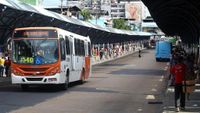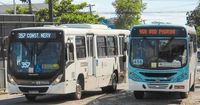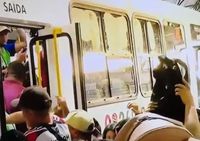The ongoing strike by bus drivers in Manaus has escalated, with the union announcing that at least 50% of the fleet will remain off the roads on Wednesday, April 16, 2025. This follows a significant stoppage on Tuesday, where approximately 50% of the buses were not in operation, disrupting public transport for thousands of residents.
Givancir Oliveira, president of the Manaus Bus Drivers Union, stated that the strike will continue indefinitely until their demands are met. The union is pushing for a 12% salary increase, an increase in the basic food basket value, and R$ 1,200 in bonuses for drivers who take on dual roles as both drivers and collectors. Furthermore, they are advocating for the preservation of jobs for collectors, a point of contention in ongoing negotiations.
During a meeting held on Tuesday afternoon with the Union of Passenger Transport Companies of the State of Amazonas (Sinetram) and the Municipality of Manaus, no agreement was reached. Oliveira noted, “Neither Sinetram nor the Municipality gave any signal to the workers.” The union rejected a proposed 5% salary increase from Sinetram and the city, insisting on their original demand of 12%.
The situation worsened when the municipality proposed to eliminate 33% of the workforce this year, a move the union firmly opposed. While the union is open to negotiating the dismissal of up to 10% of workers on less profitable routes, they refuse to accept immediate cuts of 33%.
As the strike enters its second day, the impact on daily commuters is becoming increasingly evident. Reports from various terminals in Manaus indicate overcrowding, with passengers struggling to board the few buses that are still operating. Videos circulating on social media depict commuters hanging onto bus doors in a desperate attempt to reach their destinations.
On Tuesday, the Regional Labor Court of the 11th Region (TRT 11) intervened, mandating that at least 70% of the fleet must operate during peak hours—specifically from 6:00 AM to 9:00 AM and from 5:00 PM to 8:00 PM. For other times, a minimum of 50% must be in service. Failure to comply with this ruling could result in fines of R$ 60,000 per hour.
In response to the strike, the Municipality of Manaus is actively monitoring the situation. They released a statement emphasizing their commitment to ensuring public transport remains available while respecting the workers' right to protest. The city reiterated the importance of dialogue to find a balanced solution that respects the rights of the workers while maintaining the quality of public transport services.
As tensions rise, Oliveira expressed that the strike will not end until their demands are satisfactorily addressed. “The strike has no deadline to end, and we are only beginning,” he asserted. The union is also concerned about the legality of the municipality's plan to remove collectors from buses, arguing that it violates local laws.
In a related note, the Via Verde company has reportedly begun operating buses without collectors, leading to job losses for several workers. The union is advocating for the reinstatement of these employees, highlighting the lack of any agreement regarding bus operations without collectors.
The strike's implications extend beyond just the bus drivers and the municipality; it significantly affects the daily lives of Manaus residents. Public transport is critical for about 500,000 people who rely on it for their daily commutes. The ongoing disruptions have raised concerns about access to essential services and the broader economic impact on the city.
As the situation develops, both the union and the city are urged to find a resolution that addresses the needs of the workers while ensuring that the public transport system can continue to serve the community efficiently. The next steps in negotiations will be crucial in determining the future of public transport in Manaus and the livelihoods of those who operate it.





